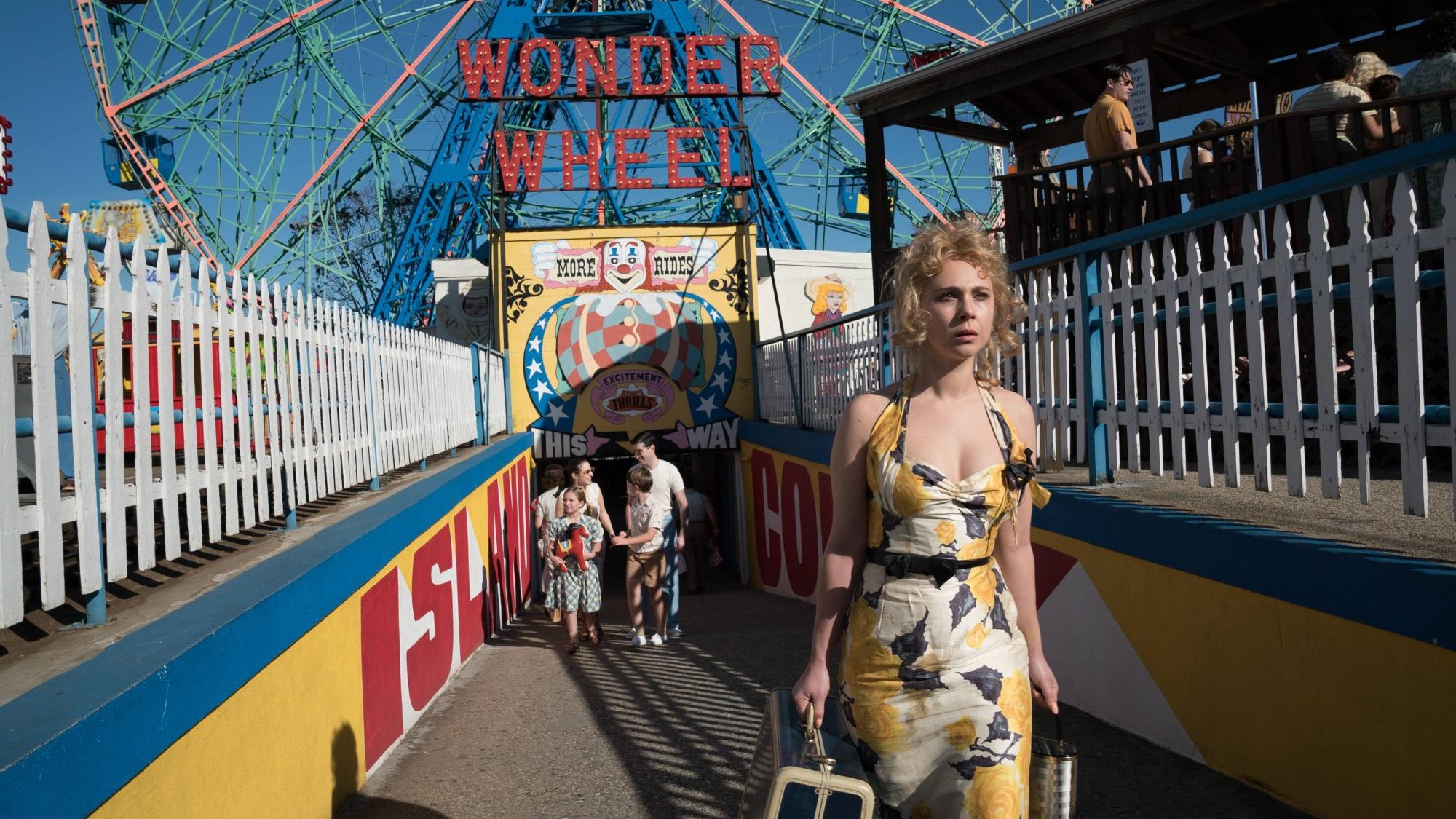–
“Wonder Wheel” by Woody Allen
The song Coney Island Washboard by the Mills Brothers doesn’t quite fit. Because his recording comes from the heyday of the large amusement parks on the New York Peninsula in the 1920s. But the story that Woody Allen set there takes place 30 years later.
“Coney Island in the fifties. The beach. The boardwalk. I work in Section 7 here.”
“Enter Carolina.”
– “Excuse me, do you know if Ginny is here?”
– “I’m Ginny.”
– “I’m Humpty’s daughter. Are you his wife?”
– “He will be quite surprised.”
–
– “I’m being hunted. They’re killing me.”
– “That’s what you get when you marry a gangster.”
… and Humpty’s wife Ginny. Kate Winslet plays the ex-actress whose first marriage ended and her second, to Humpty, is no better. When Ginny begins an affair with Mickey, she sees a way to leave her cheerless existence at Coney Island behind.
But Allen wouldn’t be Allen if he let his characters head straight for a happy ending.
“My skull is cracking. It’s all collapsing.”
– “You look a bit crazy.”
A woman on the verge of a nervous breakdown and – on a formal level – breaking through the fourth wall: “Wonder Wheel” is also pure Woody Allen. The only tragedy is that this story, which sounds like the distant echo of a Tennessee Williams story, is firstly incredibly boring, and secondly the eternal city neurotic has completely forgotten to rummage through his booklet of ideas for bon mots. It’s been a long time since an Allen film had so little esprit.
–
“Wonder Wheel”: disappointing
–
–
–
–
“The Commuter” by Jaume Collet-Serra
Filmmakers have always been fascinated by a moving train as the setting for a crime thriller or an action adventure. Director Jaume Collet-Serra now presents a combination of all three genres with “The Commuter”, his fourth film starring Liam Neeson. Similar to the three predecessors, Neeson plays a Normalo who gets into a life-threatening situation and has to surpass himself.
“Let’s do an experiment! What if I asked you to do one small thing?”
On the commuter train that brings insurance broker Michael from Manhattan to Westchester County every day, a stranger makes him a tempting offer: $100,000 awaits Michael if he tracks down a fellow passenger in possession of a bag believed to contain stolen material.
“It’s just a minor thing. Shouldn’t be difficult for an ex-cop.”
– “One second! How do you know that?”
– “I have to get out of here.”
– “You’re serious, aren’t you?”
How serious – Michael will feel that faster than he would like. Suddenly not only is he in danger, but also all the other passengers and his family at home.
Anyone who examines this train ride, which is largely played in real time, for logic holes and is already bothered by their outrageous switch setting, will end up on the siding after just ten minutes. But you can also enjoy the whole thing as a fast-paced variation on the more mannered “Murder on the Orient Express” remake.
“The Commuter”: acceptable
–
–
–
–
“Tony Conrad – Completely in the Present” von Tyler Hubby
The train keeps rolling. A train of booming, minimalistic sounds.
The sound comes towards you like a train. You stand on the tracks and suddenly he comes. Says Tony Conrad, multimedia artist and creator of these sounds. Tyler Hubby’s cinematic portrait “Completely in the Present” attempts to explore the Tony Conrad cosmos of sounds and images together with the artist. Many of the recordings were made just a few weeks before Conrad’s death in April 2016. Historical outline and analytical interviews are mixed.
Tony Conrad says he didn’t think much of the idea of pursuing a career in music. He wanted to do something different from Philip Glass, Steve Reich or La Monte Young, all of whom had the goal of becoming great composers. For him, on the other hand, it was important to abolish composition and let it die out.
Soundtracks for experimental strips, his own film experiments and minimalist soundscapes with Lou Reed and John Cale, who would later found The Velvet Underground in his apartment on the Lower East Side: the refreshing and informative documentary film is reminiscent of an avant-garde and likeable oddball who never became famous himself and yet has influenced so many other artists.
“Tony Conrad – Completely in the Present”: recommended
–
–
–
–
–

/data/photo/2022/04/10/6252ed26523bd.jpg)
